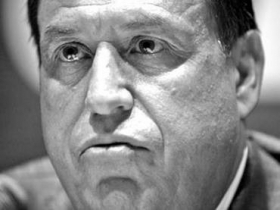A former top police official, jailed for alleged ties to drug traffickers, was reportedly tortured in prison. This could be linked to the ex-cop’s feud with one of the most powerful men in the government: Security Minister Genaro Garcia Luna.
Former Federal Police coordinator Javier Herrera Valles is among the highest-ranking security officials to be investigated, tried, and sentenced for aiding a drug cartel under the Calderon administration. In December, he was sentenced to 10 years in prison and banned from public office for allegedly receiving $70,000 a month in bribes from the Sinaloa Cartel.
As veteran crime journalist Ricardo Ravelo reported for Proceso, Herrera’s brother now says that a group of men led by a military general tortured Herrera on February 13. They entered Herrera’s cell, forced him to strip naked, and beat him savagely, the brother told Proceso. He alleged that the general was acting on the orders of Herrera’s best-known enemy: Garcia Luna, Mexico’s top police official, who heads the Public Security Department (SSP).
The feud between Garcia Luna and Herrera dates back to 2008, when Herrera made public two letters he had addressed to President Felipe Calderon, accusing Garcia Luna of incompetence and political favoritism. The implication of Herrera’s complaints was that Garcia Luna, under the guise of cleaning up the SSP, removed the men best suited to the job and replaced them with his allies, in order to protect the Sinaloa Cartel.
Garcia Luna has faced accusations of ties to drug cartels for quite some time. Ravelo previously reported for Proceso that Mexico’s Attorney General’s Office had kept a file on allegations of Garcia Luna’s relationships with drug lords since 2005, although he has never been formally investigated.
Shortly after Herrera’s complaints went public, he was arrested, charged, and eventually imprisoned for ties to various drug cartels. His brother, Arturo, another police commander, was also temporarily detained. The timing of the arrests raised suspicions that Javier Herrera was being punished for attacking one of Calderon’s closest confidants, a man whom Herrera once described as “untouchable.”
As another Herrera brother told Proceso, “It’s all a farce, it’s a fabrication ordered by Garcia Luna because my brother accused him of trafficking influence, corruption and drug trafficking.”
The beating Herrera recently received in prison was a further “revenge” carried out on Garcia Luna’s orders, the brother added.
As Proceso reported, there are additional reasons to believe that Herrera may be serving time on trumped-up charges. One witness who helped build the initial case against Herrera later retracted his testimony. He said that after enduring “psychological and physical torture,” SSP officials forced him to sign papers he didn’t read, which he later found out accused Herrera of ties to organized crime. The witness later stated, “I don’t know [Herrera] and I’ve never seen him before.” The other primary witness in Herrera’s case, who provided the most elaborate detail on Herrera’s supposed dealings with the Sinaloa Cartel, is part of a government witness protection problem, and his identity has not been made public.
The long-running feud between Herrera and Garcia Luna raises the question of how often corruption cases against Mexican officials are motivated by personal vendettas. From time to time throughout his administration, Calderon has conducted anti-corruption sweeps, expelling public officials accused of colluding with drug cartels. Herrera was supposed to be an example of justice being done, burnishing the government’s credentials as an administration committed to combating organized crime from the inside out. But Herrera’s case could instead turn out to be one of the most damning examples of top-level corruption, if the accusations of the ex-cop and his family are proven.

